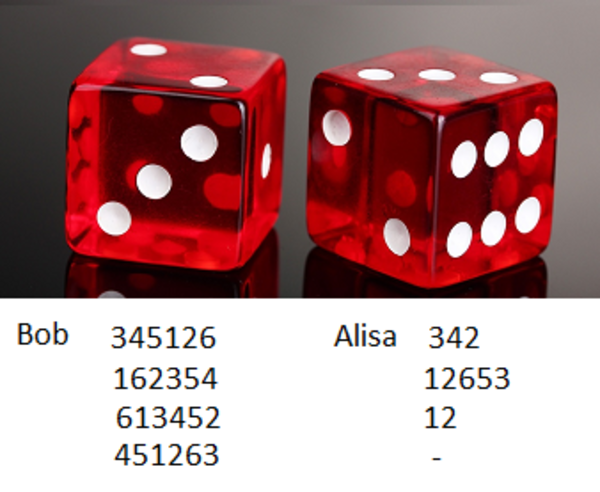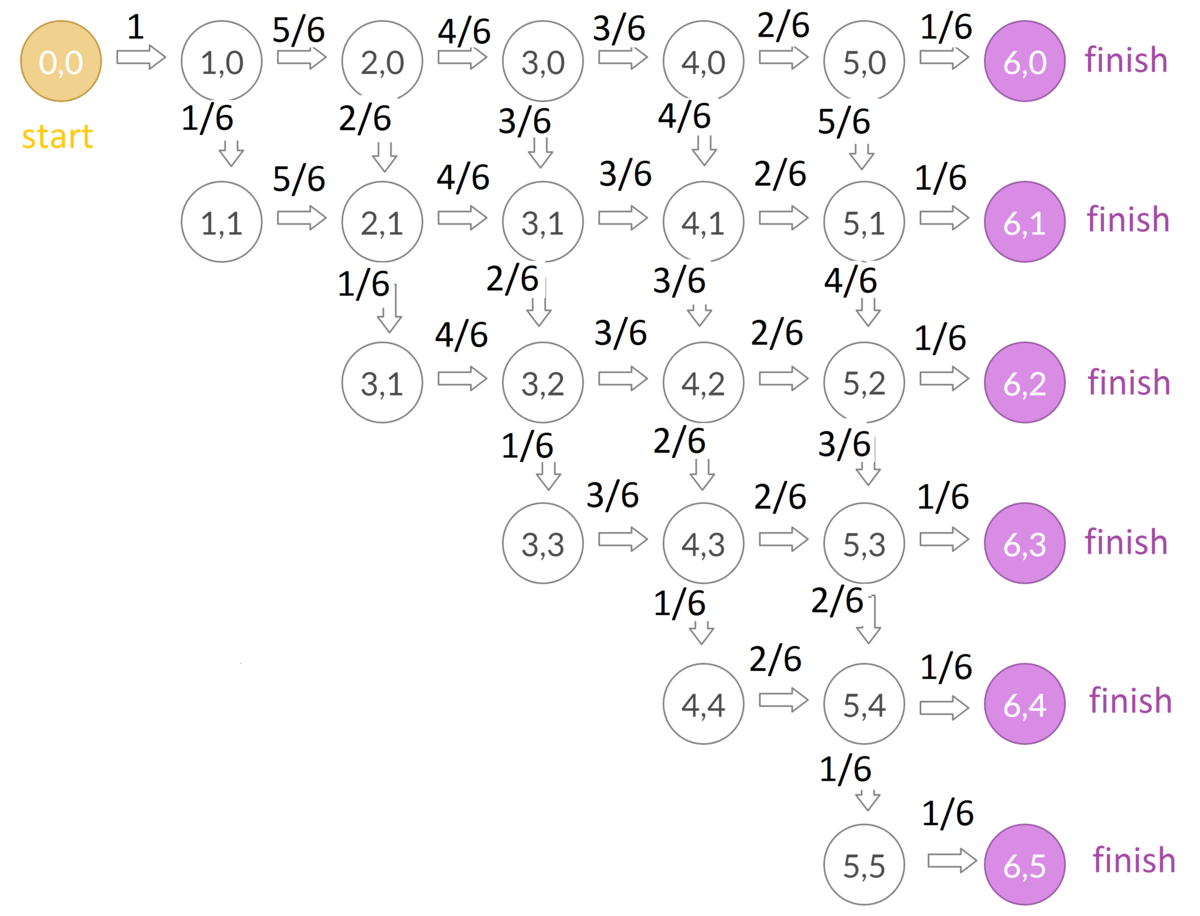Two dice sets

Bob and Alice are playing a dice game. The dice is rolled and Bob writes down a number in his notebook, if it has not already been written down. If the dropped out dice number is already written in Bob's notebook and Alice does not have it, then Alice writes this number in her notebook. The game ends when Bob has all the numbers 1 , 2 , 3 , 4 , 5 , 6 written down in his notebook. If the expected value of the quantity of numbers in Alice's notebook in the game is B A , where A , B are coprime positive integers, submit your answer as A + B .
Bob wins if size Alice's set is 5, Alice wins if size Alice's set is 4. Otherwise, the prize goes to charity.
Example. Dice set 1 , 3 , 4 , 1 , 4 , 5 , 2 , 2 , 5 , 5 , 4 , 6 , Bob set - 1 , 3 , 4 , 5 , 2 , 6 , Alice set - 1 , 4 , 2 , 5 - and the quantity of numbers 4 .
The answer is 91.
This section requires Javascript.
You are seeing this because something didn't load right. We suggest you, (a) try
refreshing the page, (b) enabling javascript if it is disabled on your browser and,
finally, (c)
loading the
non-javascript version of this page
. We're sorry about the hassle.
3 solutions
Thanks for attention.
I'm sorry but I can't quite understand how you got the E(0,0) = 71/20
Log in to reply
E 0 , 0 can be expressed in terms of E 1 , 0 and ( E 0 , 1 , E 1 , 0 can be expressed in terms of E 2 , 0 and E 1 , 1 and so on. The above relations, used many times, express E 0 , 0 in terms of E 6 , a for 0 ≤ a ≤ 5 , and hence we can calculate E 0 , 0 .
Log in to reply
Hello Sir , can you suggest me a good Maths book equivalent to the Feynmen lectures on Physics?
Set a to be the number of numbers Alice has not written yet, and b to be the number of numbers Bob has not written yet. The following Python program computes E ( 6 , 6 ) = 2 0 7 1 .
1 2 3 4 5 6 7 |
|
Absorbing Markov chain give probability P ( k ) for length k of Alisa final list. Excel use to calculate inverse matrix and matrix product.
P ( 0 ) = 3 2 4 5
P ( 1 ) = 2 0 2 5 0 0 1 2 2 8 1
P ( 2 ) = 1 6 2 0 0 0 0 2 1 8 8 9 3
P ( 3 ) = 1 6 2 0 0 0 0 3 5 6 9 3 3
P ( 4 ) = 1 6 2 0 0 0 0 4 6 0 4 6 3
P ( 5 ) = 1 6 2 0 0 0 0 4 6 0 4 6 3
Checking
3 2 4 5 + 2 0 2 5 0 0 1 2 2 8 1 + 1 6 2 0 0 0 0 2 1 8 8 9 3 + 1 6 2 0 0 0 0 3 5 6 9 3 3 + 1 6 2 0 0 0 0 4 6 0 4 6 3 + 1 6 2 0 0 0 0 4 6 0 4 6 3 = 1
Calculate the expected number
∑ k = 0 k = 5 k P ( k ) = 0 ⋅ 3 2 4 5 + 1 ⋅ 2 0 2 5 0 0 1 2 2 8 1 + 2 ⋅ 1 6 2 0 0 0 0 2 1 8 8 9 3 + 3 ⋅ 1 6 2 0 0 0 0 3 5 6 9 3 3 + 4 ⋅ 1 6 2 0 0 0 0 4 6 0 4 6 3 + 5 ⋅ 1 6 2 0 0 0 0 4 6 0 4 6 3 = 2 0 7 1

Fun fact: the 2 7 possible states (Bob, Alice pairs) are all the tiles in a standard set of dominos except the double six.
Let E b , a be the expected number of numbers in Alice's final list, given that Bob currently has b numbers in his list, and Alice has a of them, for 0 ≤ a ≤ b ≤ 6 , excluding the case a = b = 6 . We can define the following recursive relations: E 6 , a E b , b E b , a = = = a E b + 1 , b 6 b − a E b , a + 1 + 6 b E b , a + 6 6 − b E b + 1 , a 0 ≤ a ≤ 5 0 ≤ b ≤ 5 0 ≤ a < b < 6 and these equations give E 0 , 0 = 2 0 7 1 , making the answer 7 1 + 2 0 = 9 1 .